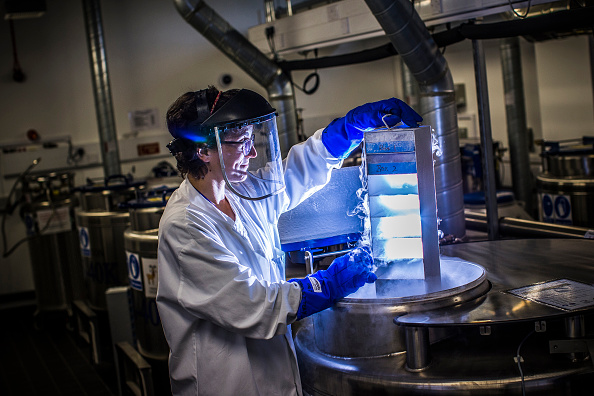Breakthrough: UK researchers find new Covid-19 treatment that injects ‘artificial’ antibodies

Oxford-based medical researchers have found a new treatment that has managed to reduce death among patients admitted to hospital with severe Covid-19.
The idea is to inject these artificial antibodies so they bind to the virus in a bid to stop the infection in its tracks.
The therapy uses two artificial antibodies, these are generated in a lab to make very potent antibodies.
These two monoclonal antibodies, casirivimab and imdevimab, bind specifically to two different sites on the coronavirus spike protein, neutralising the ability of the virus to infect cells.
Because this treatment uses two types of artificial antibodies, it is hoped it will be able to bypass any resistance the patient builds up against one of them. It is also hoped by using a combination of antibodies, the likelihood of viral variants to escape treatment is diminished.
Trial with UK patients
Between September of last year and 22 May, 9,785 UK patients admitted to hospital with the disease were randomly allocated to receive usual care plus the antibody combination treatment, or usual care alone.
The trial demonstrated that the antibody combination developed by Regeneron reduced the risk of death when given to patients with severe Covid-19, who had not mounted a natural antibody response of their own.
The chances of these patients needing to be put on a ventilator were also reduced, as was the duration of their hospital stay.
Of these, about one third were seronegative, meaning they had no natural antibody response of their own, and half were seropositive, meaning they had already developed natural antibodies against the virus.
For one sixth of those involved in the study, their serostatus was unknown.
Researchers found that among patients who received usual care alone, 28-day mortality was twice as high in those without an antibody response (30 per cent) compared with those who were seropositive (15 pet cent) at the start of the study.
According to the study, for patients who had no antibody response the treatment reduced the chance of them dying within 28 days by a fifth, compared with usual care alone.
For every 100 such patients treated with the antibody combination, there would be six fewer deaths, researchers say.
“What we found was amongst these patients who were seronegative – they hadn’t raised antibodies of their own, if you then gave them this combination of two antibodies in an intravenous infusion, then mortality was reduced by one fifth,” explained Sir Martin Landray, professor of medicine and epidemiology at the Nuffield Department of Population Health, University of Oxford, and joint chief investigator.
“So instead of 30 per cent dying, 24 per cent died. So if you think of it differently, for every 100 patients who were given the intravenous infusion, we would save six lives,” he added.
“Take a group of people, they’re sick, they go into hospital, they’ve got Covid, they haven’t got antibodies of their own, (this) will reduce their chance of dying, shorten their hospital stay, and reduce the chances of needing a ventilator.”
“So this is in some ways a first. This is an antiviral treatment that is used later on – because these patients are severe, they’ve gone into hospital – and has a demonstrated clear impact on survival, and on those other outcomes,” Landray said.
“So in its own right, it’s an important result because these patients are among the sickest patients, and here we now have a treatment we did not have before.”
For the seronegative patients given the treatment, the duration of hospital stay was four days shorter than the usual care group, and the proportion of patients discharged alive by day 28 was greater (64 per cent vs 58 per cent).
The treatment made no difference in patients who had mounted their own antibody response by the time the study started, researchers found.
‘Very exciting’
According to Sir Peter Horby, professor of emerging infectious diseases in the Nuffield Department of Medicine, University of Oxford, and joint chief investigator for the Recovery trial, said: “These results are very exciting.
“The hope was that by giving a combination of antibodies targeting the Sars-CoV-2 virus we would be able to reduce the worst manifestations of Covid-19. There was, however, great uncertainty about the value of antiviral therapies in late-stage Covid-19 disease,” he explained.
“It is wonderful to learn that even in advanced Covid-19 disease, targeting the virus can reduce mortality in patients who have failed to mount an antibody response of their own.”
Researchers say they are not sure when the treatment will be approved for use in the UK, and highlight it will not be a quick rollout as the drug is not particularly easy to get hold of, and patients would need antibody testing on their admission to hospital – which is not currently in place.
The study will be published as a pre-print on medRxiv and submitted to a journal for peer-review.
The treatment uses a combination of two monoclonal antibodies (casirivimab and imdevimab, known as REGEN-COV in the US) that bind specifically to two different sites on the coronavirus spike protein, neutralising the ability of the virus to infect cells.
Previous studies in patients in the community showed that the treatment reduced viral load, shortened the time to resolution of symptoms, and significantly reduced the risk of being admitted to hospital or death.